 |
 |
 |
If there were a school for aspiring sports mangaka, Baby Steps should be a required course.
It’s never been harder to write about this show knowing what’s coming than it is right now, because we’re being reminded of just how good it is as building up the moment. There are so many things I want to talk about but can’t, though there is solace in the fact that there’s a hell of a lot from the episode itself to discuss. You can search long and hard and not find the classic buildup ep done as well as this (Giant Killing comes to mind as a series that came close, but it’s pretty rare).
And then there’s the matter of whether we’re going to get more anime after this season, a question to which I have no more answer than anyone else. It was awfully nice seeing Volume 36 of the manga hit 110,000 in its opening week, the first time it’s broken five figures – clearly the anime is having an impact on manga sales. But is it enough to keep the production committee invested? I wish Baby Steps were involved in more cross-promotion with the Japanese tennis federation, because it’s glorious advertising for youth tennis in Japan – especially with the rise of Nishikori Kei and the Olympics coming to Tokyo.
Pretty much every sports series gives you multiple buildup episodes every cour. And at their worst they can be throwaways, time-fillers – but they really should be just as essential as the battle eps. And there’s so much that Baby Steps does here that you just wouldn’t see in other series – the focus on the complicated mental implications of romance on athletic success, the involvement of Ei-chn’s mother, the influence of equipment sponsors – it’s all part of the picture for young athletes aiming to be pros. And they’re part of the influences Ei-chan must balance as he prepares for the biggest match of his life, against the opponent who fascinates and vexes him more than any other.
The secret is certainly out about Maruo and Nat-chan now for better or for worse – and it seems to be mostly better. They do indeed make a great couple (as Aoi-koochi points out), and for most shows that would be enough. But the different way in which they process their relationship is interesting and important. For Nat-chan it’s pretty straightforward – she loves Ei-chan and being with him makes her happier, and thus stronger on the court (the “power of love”). Chasing a dream of climbing to the top together is motivation in itself. But for Ei-chan (and males in general) the tendency is to compartmentalize – “romance mode” and “battle mode”. Ei-chan doesn’t find it as easy to take the happiness he feels over being with Nat-chan and channel it into relaxing on the court – it’s more of a distraction.
It’s been a theme for a while – if these two can take some of the best of the other and incorporate it into themselves, they’ll be better players (and it’s not a bad template for a relationship, generally speaking). That’s why Aoi-koochi had them play each other in the first place, of course. But love isn’t the only potential distraction for Ei-chan – there’s his mother, too. She’s utterly amazed that her son is in the Top 4 in Kanto, and depressingly skeptical about the prospect that he could actually beat the #1 junior in Japan – or that people can actually make a living playing tennis. She promises to come see Ei-chan in the final if he wins, but that’s even more pressure on him, since her buy-in is essential if Ei-chan is going to pursue his dream of making a living in tennis (with Nat-chan at his side, of course).
With all that on his shoulders, Ei-chan must gear himself up to face what must feel like a better and more experienced version of himself. Takuma is in town for a minicamp, and he shares an interesting bit of information wth Maruo – Nabae-kun wasn’t always the smooth machine he is now. He was a strong-willed terror as a child, prone to worse tantrums than Aray on the court. That’s a difference with Ei-chan, who seems always to have been a pretty focused and analytical person. Does it matter, if Nabae has overcome it now?
On the eve of the match Ei-chan takes a few moments to watch Nabae practice, though that’s interrupted by the arrival of one of his racket manufacturer’s reps. It’s no surprise that Nabae is obsessive about his rackets, but it does come as a surprise to Ei-chan that junior players get equipment for free – another aspect of the sport that’s new to him. Nabae eventually retires to talk about Maruo with Takagi, and Ei-chan winds up discussing strategy with Aoi. I love this scene, because it’s great to see how much Ei-chan is enjoying the moment, and how much Aoi-san is enjoying seeing him enjoy it. This is what we play sports for – to get to the moment where we can put all the practice and analysis into play, and compete with everything on the line. But few of us are lucky enough to have the chance to do it on a stage as big as this, small as it is in the big picture of professional tennis.
This is the moment, then – the ultimate test to see how far Ei-chan has come. Nat-chan gives him one last power boost before the match – a promise of a real date once the Kanto Junior is over – and Ei-chan seems to have found a way to use his feelings for Nat-chan as an inspiration rather than a distraction. In the face of all the distractions and challenges, he walks onto the court believing he can win – and that’s the first baby step he has to take if he’s going to have a real chance. Aoi’s words – “Go for the lines, and try for an ace on every serve” – seem to be resonating in Ei-chan’s ears based on the fearless way he plays the first few points. But tennis is a two-person sport, and when the opponent is as formidable as this, what you bring onto the court only goes halfway towards telling the story…
 |
 |
 |
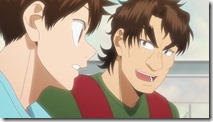 |
 |
 |
 |
 |
 |
 |
 |
 |
 |
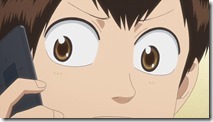 |
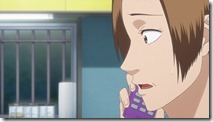 |
 |
 |
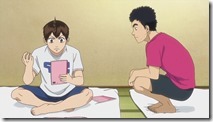 |
 |
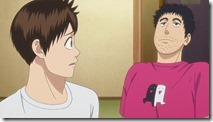 |
 |
 |
 |
 |
 |
 |
 |


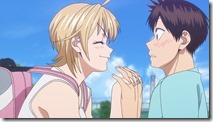
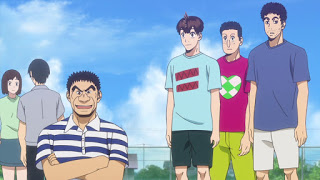
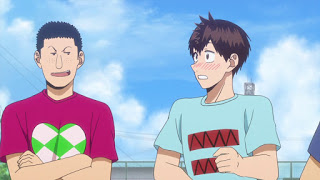
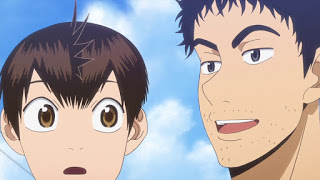
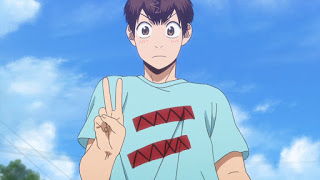
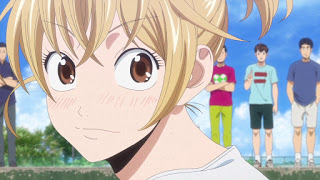
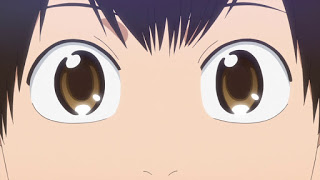
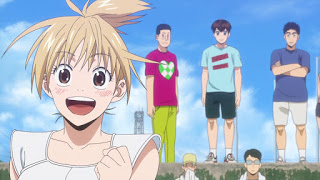
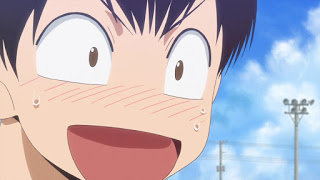

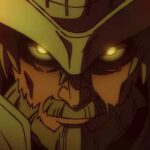
Earthling Zing
August 31, 2015 at 11:01 amI'm excited for the match, it'll probably end up being more of a game of wits than anything we've seen so far…
Jay Psi
August 31, 2015 at 4:52 pmWe've see Nadal's influence, and arguably some of Djokovic's (with some more to come, although they won't be animated in this series), so it was about time a tale from Federer was used. I'm sure there have been plenty of pros who threw tantrums in their youth, but I suspect Federer is the most well-known not only because of what he did then, but because of what he does now. With Nabae we have a reasonable guess as to how such a character trait may have been overcome.
I've been waiting for the moment when Maruo goes for the lines and aces from the off. It brings a real sense of urgency to what he is doing and makes no qualms about the fact that he is playing at an extremely high level. It does feel like things have progressed rather quickly from beating Ide (particularly the character assassination of Takagi), but not unbelievable so, and that is the ultimate credit to Baby Steps.